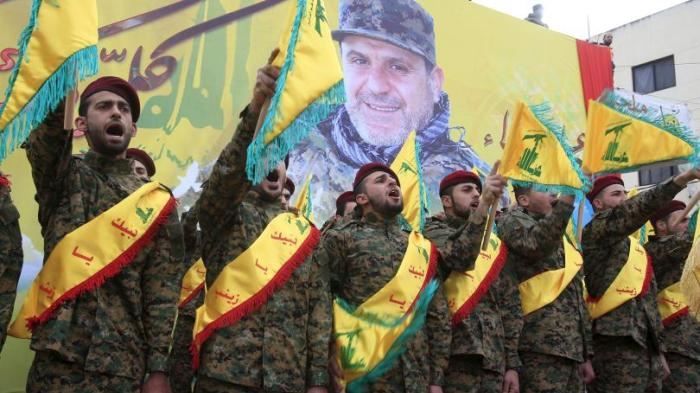No Sharing of the Neighborhood?: Saudi Arabia doubling down on Hezbollah

(Hezbollah members chant in front of a picture of Ali Fayyad, a senior commander of the group who was killed in Syria. Photo: Ali Hashisho/Reuters)
Historical irony is working at its best: three days after the anniversary of the 1985 Bir al-Abed terrorist attacks that was coordinated by Saudi Arabia and CIA, Riyadh successfully pushes for a resolution in the Arab League to designate Hezbollah as terrorist organization.
In mid-1990s, when the role of Bandar bin Sultan, then Saudi ambassador to Washington, in the attack was disclosed, Hezbollah decided not to make propaganda use of the revelation in order to avoid dispute with Saudi Arabia. Improved ties between Iran and Saudi Arabia also gave no room for maneuver up until recently, when tensions between Tehran and Riyadh led to revival of focus about Saudi Arabia-sponsored terrorist attacks.
Despite extended struggles between Hezbollah and Saudi Arabia, from Syria to Yemen, Bahrain and Iraq, even the most pessimist observers would not see a day coming where Riyadh would rally the region behind itself to punish not only Hezbollah, but also the Lebanese government and nation.
After convincing the Persian Gulf Cooperation Council of labeling Hezbollah a terrorist group, last Friday Riyadh managed to persuade the Arab League to make a similar decision, although Iraq, Lebanon and Algeria abstained to support the related article in the final declaration of the league. Rumors have it that Lebanon's refusal to denounce the attack on Saudi embassy in Tehran has initially triggered Riyadh's chain of actions that include halting a 3-billion dollar aid to the Lebanese army, warning its citizens about visiting Lebanon, and floating the idea of expelling Lebanese residents in Saudi Arabia, a strong punishment knowing how expats' revenue upholds the Lebanese economy. Riyadh also took a further exceptional step and along with Bahrain, Qatar, Kuwait and the UAE refused to vote in favor of an article in the final declaration of the Arab League which endorsed Lebanon's national unity and sovereignty, and its right to reclaim territories occupied by Israel.
Trying to overcome successive defeats in the Middle East game, Saudi Arabia is resorting to every tool that can help it cover up its diplomatic failures, even if it means stoking sectarian tensions and creating a Sunni Arab vs. Shia Iranian duality. In confronting Iran, Saudi enjoys a diversity of tools. On the one hand, it is supplying terrorist groups such as al-Nusrah and Ahrar al-Sham with money and arms, and on the other hand it uses its influence in a wide range of international organizations to issue favorable statements. Fiscal incentives and punishments are also on the table: Sudan and Djibouti receive massive financial aids to cut ties with Iran, while Lebanon is deprived of aids. Even Russia was offered tempting deals which it turned down. Consequently, Riyadh campaigned for lower oil prices in order to deprive Moscow and Tehran from much-needed oil revenues.
However, it seems that Saudi Arabia's efforts to list Hezbollah as a terrorist organization will not bear the results that Riyadh favors. After all, Lebanese do not want to face a similar fate as Yemen and see the Saudis operate their war machine in Lebanon. Less than 24 hours after the Arab League issued its declaration, Saad Hariri, a natural ally of Saudi Arabia criticized the declaration for interfering in Lebanese domestic policies.
Hezbollah is now at the height of its power, holding control of Lebanon's security affairs. The group justifies its presence in Syria as a preemptive war with takfiris so as terrorists do not extend the war to the Lebanese territory and boast its success in keeping Lebanon immune from the spillover of war in Syria. But can Riyadh claim a similar thing? In Yemen, it is fighting against Ali Abdullah Saleh, once its ally. In Egypt, Riyadh backed efforts to topple the first elected government of the country. But in Lebanon, such efforts have backfired, leading to proximity between the Future Movement and Hezbollah. Riyadh's policies mean creating more leeway for Iran's allies, and reinforcing the influence of their powerful rival Iran, despite Obama's recent recommendation to Riyadh "to share the neighborhood". Have Saudis, like Netanyahu, decided to stop listening to the White House?
* This article was originally published in Iranian Diplomacy Persian. Majid Moradi is an Iranian scholar currently residing in Beirut.

